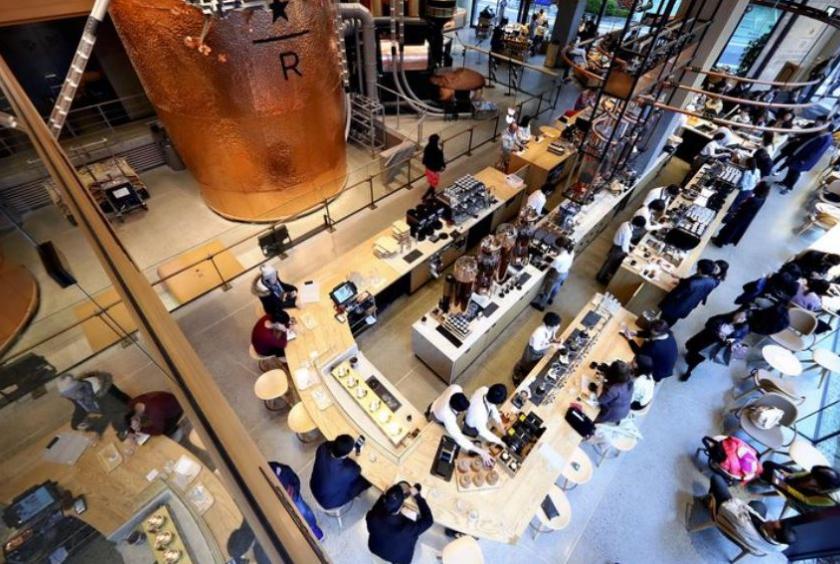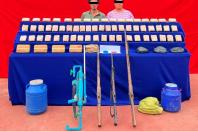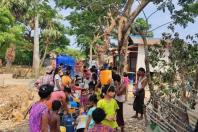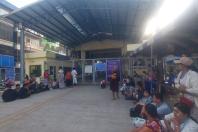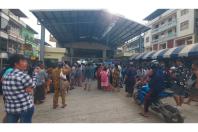(Japan News/ANN) - Cafes are not only for coffee lovers these days. An increasing number of establishments is also catering to those who don’t drink coffee. There is a theme park feel to these cafes, showing how coffee beans are roasted and offering visitors new coffee experiences using all five senses.
As soon as I entered the Starbucks Reserve Roastery Tokyo in the capital’s Meguro Ward, I could hear sounds similar to those of waves. Green coffee beans from jute bags were being funneled into transparent pipes to a storage container. A faint aroma of fresh beans wafted in the air.
Opened in February, the Tokyo store is the fifth in a series of roastery flagships that Seattle-based Starbucks has opened since 2014, following ones in Seattle, Shanghai, Milan and New York.
Starbucks Reserve Roastery Tokyo has a large roaster more than two meters in diameter. Standing beside the device, roaster Komugi Sugita was speaking to customers about coffee beans, placing golden brown and dark brown ones on a tray.
“The colors and aromas of coffee beans change depending on how they’ve been roasted,” she said.
Members of staff actively communicate with customers, offering information on such topics as roasting and brewing, the countries of origin of the beans and sometimes even about the farmers who grow the coffee.
“It seems a lot of drama is involved in making a cup of coffee,” said a nurse from Tamana, Kumamoto Prefecture, who was visiting the cafe.
There have always been shops that focus on specialty beans and roasting, but recently a growing number of them are conveying their dedication in unique ways.
In Nakagyo Ward, Kyoto, alt. coffee roasters, which specializes in light roasted coffee, opened in mid-March near the Nijo-jo castle World Heritage site. The owner and coffee roaster Chihiro Nakamura does all the work by herself, from selecting the beans to brewing.
“I get all my five senses ready when I prepare each cup of coffee,” she said. “Some customers are surprised when they find my coffee keeps its rich flavor even after it gets cold.”
Nakamura trained as a roaster in Melbourne, dubbed a “coffee capital.” She then opened her coffee shop in her hometown of Kyoto. Her coffee is served in wineglasses so that customers can enjoy, like wine, the flavors of different beans depending on where they are produced.
“Coffee beans are the seeds of a fruit similar to cherries,” Nakamura said. “When they’re lightly roasted, you can enjoy their fruity flavor.”
When roasting, Nakamura assesses the characteristics of the beans she is dealing with so the heat can go through their core efficiently in a short period of time, thus extracting the distinctive aromas of her beans. The clean flavors in her coffee are a perfect complement to her shop’s handmade, vegan-friendly sweets made of tofu, burdock and other plant materials.
Yoko Kawaguchi, an author of books about cafes, pointed out that now is a time when cafe culture has taken root. There are many gourmets out there, she said, and people are not easily impressed anymore.
“Cafes try to differentiate themselves from others by providing firsthand experiences or visual inspirations that make customers feel like posting images online,” she said.
Workshops available
Many workshops are held to teach customers about coffee.
Maruyama Coffee Co., an operator of 11 coffee shops based in Karuizawa, Nagano Prefecture, opened a workshop facility in Tokyo in 2011 to increase the number of coffee lovers. The facility offers tasting events to let participants compare various kinds of coffee as well as a range of seminars for beginners to those who aim to become experts.
Tully’s Coffee Japan Co., based in Shinjuku Ward, Tokyo, has created an in-house system to certify instructors who hold coffee school programs. Offered workshops include three basic courses for beginners to those at a professional level. The program is provided at the chain’s about 720 shops. Each workshop costs ¥2,000, including coffee beans and other gifts to take home.

